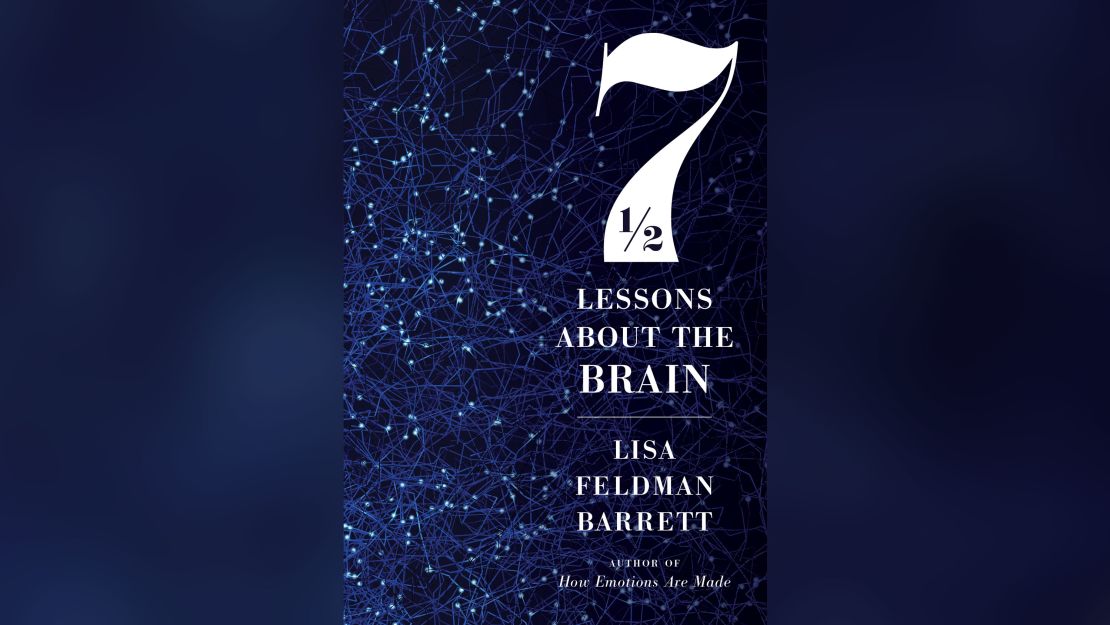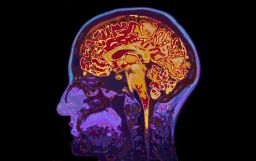Many of the ideas and metaphors in popular culture about how the human brain works don’t stand up to scrutiny.
That’s a prevailing theme in Lisa Feldman Barrett’s new book “Seven and a Half Lessons About the Brain,” released in November.
Barrett is a university distinguished professor of psychology at Northeastern University in Boston, where she directs the school’s Interdisciplinary Affective Science Laboratory. She also holds appointments at Harvard Medical School and Massachusetts General Hospital.

She has made significant contributions in helping to understand the fundamental nature of emotion. Her pioneering research in neuroscience has landed her among the top 1% of most cited scientists in the world, and a 2019 Guggenheim Fellowship in neuroscience.
Here Barrett answers seven and a half questions about how brain science can help you have a more productive and prosperous life.
This conversation has been edited for length and clarity.
CNN: Why did you decide to call your book “Seven and a Half Lessons”? Is that a neuroscientist’s Jedi mind trick to get the title to stick in our heads?
Lisa Feldman Barrett: Yes, it was a Jedi mind trick at work. Did it stick in your head?
CNN: It’s definitely sticking in my head.
Barrett: Actually, in the first draft of the book, it had seven lessons. But an early reader suggested splitting the first lesson into two parts, which is the lesson on brain evolution. The first half lesson is really just a short peek into a much larger story on brain evolution so I thought calling it “a half” sounded reasonable. Having a science book called “Seven and a Half Lessons” does indicate that I hope this is supposed to be fun and entertaining.

CNN: Something else that stuck with me is how you wrote that the human brain is constantly making predictions about what it expects to see, and you talked about it as a “carefully controlled hallucination.” How do our brains give us information about the world that isn’t exactly true?
Barrett: Think about the last time you were drinking a glass of water. Within a couple of seconds you feel less thirsty. And that’s actually a remarkable thing, because the water that you drink doesn’t reach your bloodstream for about 20 minutes. How is that water quenching your thirst so quickly? And the answer is because your brain has learned from past experience that drinking water makes you less thirsty, so your brain is making a prediction.

It predicts that you’ll feel less thirsty, and that prediction becomes your experience, and so your thirst diminishes quickly. And so really what your brain is doing is predicting – the brain actually operates by prediction all the time. The process is largely invisible to you. But it’s happening under the hood and everything you’ve experienced is some combination of what’s in your head.
CNN: So our brains predict what will happen before it happens. Are we slaves to our own brains, or can we consciously get around this to retain our free will?
Barrett: The question is really whether a brain is a slave to itself, or is there an opportunity for free will?
Free will is a topic that philosophers have been debating forever. A little book isn’t gonna settle it, but from understanding how the brain predicts, we can shed some light on the question of free will. It’s true that your brain predicts your actions and launches your actions before you’re aware of them. Think about a baseball player about to launch into a swing well before he consciously needed to. If he waited until later, he wouldn’t have enough time to swing, and he’d always miss the ball. Prediction is crucial. We don’t experience our life this way, but this is actually what’s happening.
Your brain predicts and launches your actions based on data, namely, based on your past experience.
The baseball player takes into account what he knows about the pitcher and the conditions of his own body to make a really good prediction about where the ball is going to be in a moment from now. That’s where he swings and is prepared to hit.
This example reveals something important: If you curate useful experiences for yourself, you can change your brain in future predictions.
That is a form of free will we rarely discuss. You are always cultivating your past, which helps you control who you will be in the future.
CNN: Many are setting New Year’s resolutions right now. What principles from this book can people use to get their resolutions to stick?
Barrett: You have a predicting brain that launches your actions and prepares your experience based on what you have learned or experienced yourself in the past. So the best way to stick to a New Year’s resolution is to practice it in advance so that your brain learns to issue new predictions about your New Year’s resolution in an automatic way. It’s like driving.
At first when you practice something it requires a lot of attention – you have to really work at it. But over time, if you practice it becomes automatic and effortless, really. So, if your resolution is to spend more time with your kids or to learn a new musical instrument, you can start today, you don’t have to wait for the New Year.
And you can practice the skill, cultivate the experience as much as you can, giving your brain lots of practice to predict automatically in the future. Again, it’s this idea that you are the architect of your experience. If you seed your brain with new experiences today, this will encourage your brain to predict differently tomorrow.
CNN: And, for my half question, do you have any resolutions this year?
Barrett: I have several New Year’s resolutions. One of my goals is to engage with people who have very different points of view from me, politically, to be curious, instead of being judgmental or close minded. I think that this is the most patriotic thing I can do right now in our current politically charged moment.
So you can think about it as an investment that you’re hoping to see a return on. It’s a worthy investment. So, I’m gonna try hard to go for communication, over affirmations, that’s my goal.
My other resolution is to knit because it’s actually a skill that is somewhat meditative. I think it’s probably going to be as hard for me to learn that as it is to talk to people who disagree.
CNN: Our mental predictions matter for New Year’s resolutions, but they also matter in politics. After the election, how do you recommend using neuroscience to help us have better political conversations?
Barrett: My main recommendation is to be curious about other people’s perspectives, to focus on communication and not affirmation.
In every moment your brain is running a sort of budget for your body. But instead of budgeting money, it’s budgeting water, salt, glucose and other resources so that your body has what it needs at the right time to keep you alive and well. This budgeting process also produces your most basic feelings, like feeling pleasant or unpleasant, feeling comfortable or distressed, feeling calm or activated.
So when you encounter political ideas that you dislike, there’s a lot of uncertainty. Your brain is using some extra resources to process them. It’s like a withdrawal from your body budget because things that are unpredictable or dislikable are more expensive metabolically. This withdrawal can feel unpleasant.
The two most expensive things your brain can do is move your body and learn something new. When you exercise, you spend a lot of metabolic resources. You’re making a big expenditure but you think about that as an investment in a healthier brain in the future.
The same thing is true about learning something new. The more that you learn, the more you expose yourself to new things and the more new things you’ve learned, the more flexible and resilient you are in your own life.
CNN: Politicians often play to our base instinct, or our “lizard brain.” How do insights in evolutionary biology actually undo the classic idea of the primitive reptilian part of ourselves?
Barrett: The idea that humans have a primitive lizard brain with base instincts is a very popular story, but it’s just a story. We can trace it all the way back to ancient Greece, but it became popular in the mid 20th century, when the best technology that neuroscientists had available for examining brains was a microscope. And the naked eye.
When you look at a lizard brain and at a mammalian brain, like a rodent’s, and you look at a primate brain, and they work, you know, like a monkey or chimp and then you look at the human brain, we see their brains look very different to the naked eye.
But today, using advanced tools that we have for examining the molecular genetics inside of brain cells, we can see clearly that the human brain didn’t evolve by growing the parts to layer on top of the lizard brain. Instead, we’ve discovered something much more interesting, which is that the brains of all mammals, and possibly all vertebrates, actually, are built from a single manufacturing plan.
What this means is that your brain and my brain, and a rat’s brain and a dog’s brain, and maybe a lizard brain and some bird brains, all look different. But they have the same basic complement of neurons. Those neurons may arrange themselves in different ways.
As brains get bigger over evolutionary time, they reorganize themselves like companies. That’s the neurobiologist George Streeter’s saying, that brains are like companies: They reorganize as they grow.
CNN: Modern Western society often prizes reason over passion, as though we have to harness or constrain our emotions to be fully human. Why might science say it’s actually most rational to embrace our emotions?
Barrett: Remember, your brain is always running a budget for your body. Sometimes your feelings are at front and center in your attention, and sometimes they’re in the background. But they’re always there, which means that rationality cannot be an absence of feeling. Your brain wiring guarantees that this is the case.
Sometimes your brain makes an emotion as your brain explains what’s going on inside your own body in relation to the world. Sometimes emotions are actually rational, like when you feel afraid because you’re in danger. And sometimes thinking is not rational, like when you scroll through social media for hours telling yourself that you’re bound to come across something important.
Get CNN Health's weekly newsletter
Sign up here to get The Results Are In with Dr. Sanjay Gupta every Tuesday from the CNN Health team.
There are examples where emotion is a deep form of wisdom that you can draw on to help guide your decisions. It’s important to understand that, both from a neuroscience standpoint and just from a common sense standpoint.
It’s not really useful to think about the human brain or the human mind as a battleground between thinking and feeling for the control of your behavior. The idea that thinking and feeling are distinct mental events, that rationality and emotion are in a constant battle for control of your behavior is a very Western story. These are not universal elements of human nature.













